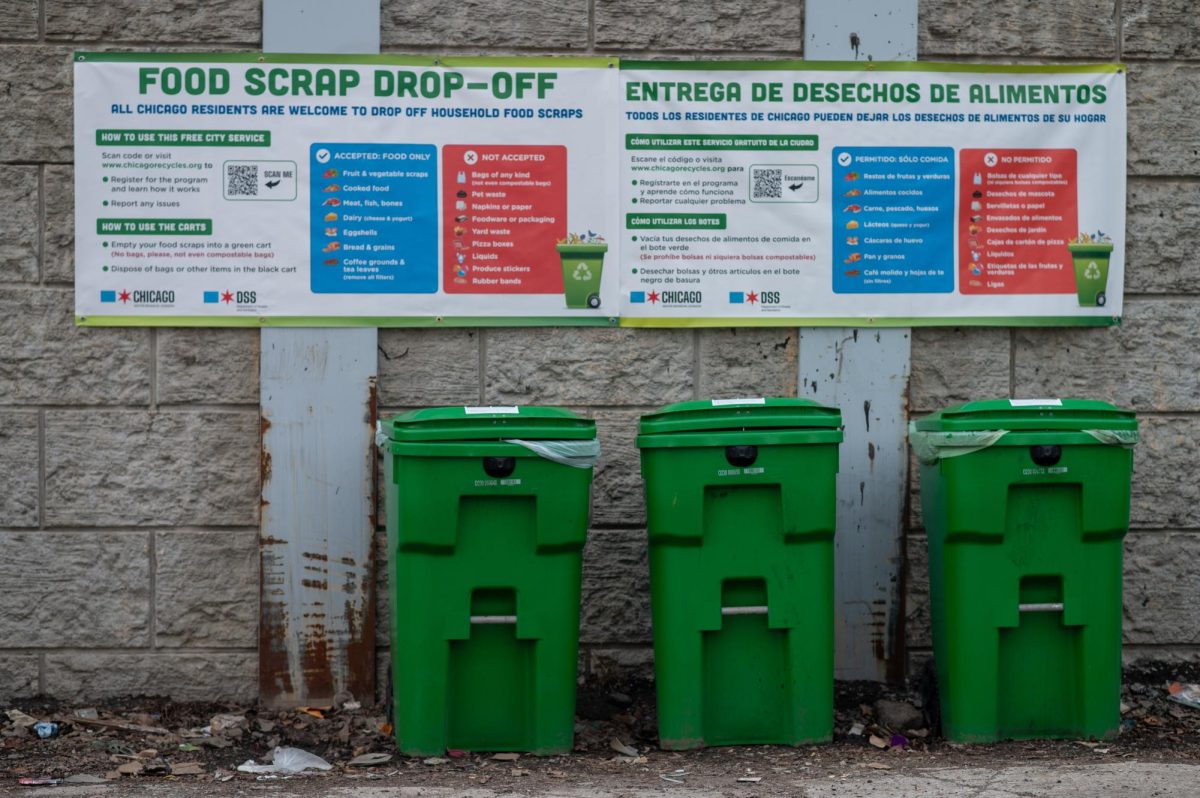Every day, tons upon tons of biodegradable material are buried in landfills, where they fail to decompose. Trapped by numerous layers of garbage and plastics, the scraps go to waste, and even produce harmful greenhouse gases such as carbon dioxide and methane. But Chicago is taking initiative to divert some of this biodegradable material, and 3,000 people are already on board.
The City of Chicago announced the first citywide composting program for Chicago residents in October under Mayor Brandon Johnson. The Department of Streets and Sanitation set up 15 food scrap drop-off sites around Chicago hoping to keep food scraps out of landfills and reduce greenhouse gas emissions.
“As we bring composting options to all Chicago residents, we can reduce harmful greenhouse gas emissions that occur when organic food material decomposes in a landfill, return organic materials to the earth, and most importantly, create healthier communities across our great city,” Mr. Johnson said in a press release.
Susan Casey, Chicago’s program director for composting and food waste, acknowledges the challenges in getting the community involved with the program.
“We know not everyone is going to take advantage of this program. Some people might wait until there is one closer to their house, they might not be interested, or it might take a little more to get them to participate,” she said in an interview with the Midway.
Ms. Casey explained that Chicago is learning from cities like Minneapolis and New York, which already have similar composting programs.
The scrap drop-off sites accept a wide variety of scraps, including meat, fish and coffee grounds. However, there is also a strict list of scraps that are not accepted, such as pizza boxes and bags of any kind — even compostable bags.
Composting options at Lab are a different story. Senior Micayla Hatcher, Green Team president, thinks Lab’s composting is lacking.
“Right now, we aren’t doing enough. We used to have a composting program, but it stopped during COVID,” Micayla said. “Green Team is currently working on reinstituting it, but we will need people to sign up — we will send out an interest form soon.”
She also notices that a lot of people are not aware of how to compost, and that there are many composting service options for students outside of Lab.
Science teacher Kenny Fournillier, who has in previous years taught environmental science, explained that if food scraps are put into a landfill instead of being composted, they are forced to decompose anaerobically, which means to decompose with very little oxygen because it is buried under layers of other material. Since organic material mainly relies on oxygen to break down, in landfills it starts to make different products, like greenhouse gasses.
The composting program, if successful, has potential to make a big difference in the amount of food scraps in landfills, but Dr. Fournillier worries that people won’t take initiative to compost even with the program.
“I think it’s a good idea,” Dr. Fournillier said. “It’s people actually taking their food scraps to those locations that is probably going to be an issue. It’s always going to be more convenient if a truck goes by and just picks it up, but they have to start somewhere.”
The 15 food scrap drop-off sites for the program are:
Morgan Park – 11059 S. Homewood Ave.
Englewood – 611 W. 69th St.
West Englewood – 1756 W. 74th St.
West Edelson – 3720 W. 55th St.
Grand Boulevard – 4352 S. Cottage Grove Ave.
Brighton Park – 3559 S. Maplewood Ave.
Near South Side – 1758 S. Clark St.
Lower West Side – 1944 W. Cullerton St.
West Town – 2505 W. Grand Ave.
Logan Square – 2460 W. Cortland St.
Belmont Cragin – 5605 W. Grand Ave.
Avondale – 3143 N. Rockwell St.
Bowmanville – 5333 N. Western Ave.
Irving Park – 4605 W. Lawrence Ave.
Norwood Park – 6453 W. Higgins Ave.





















































